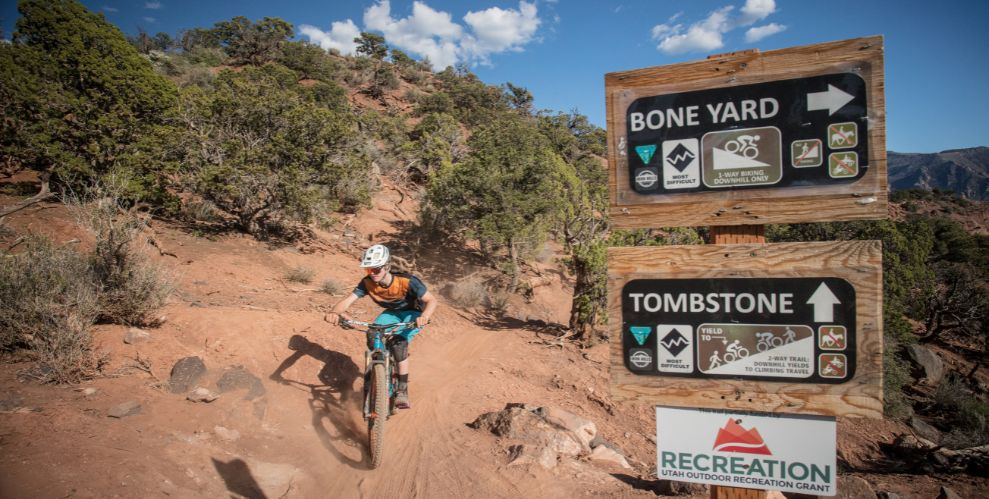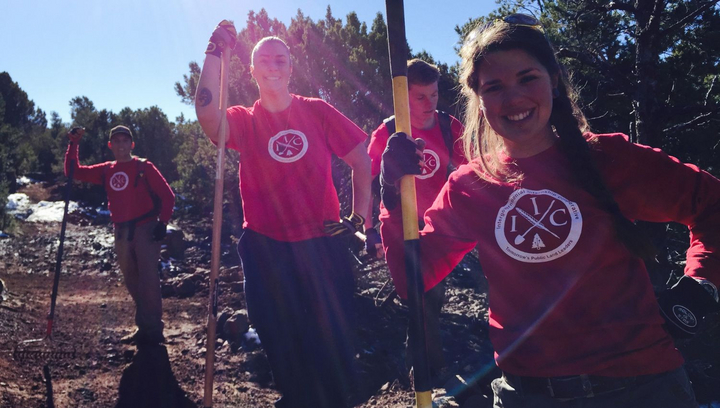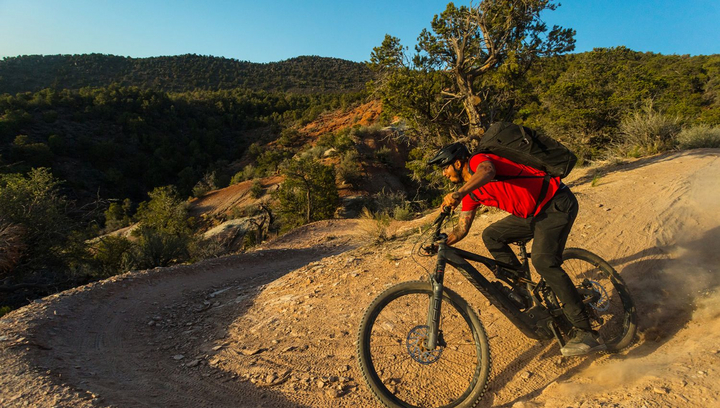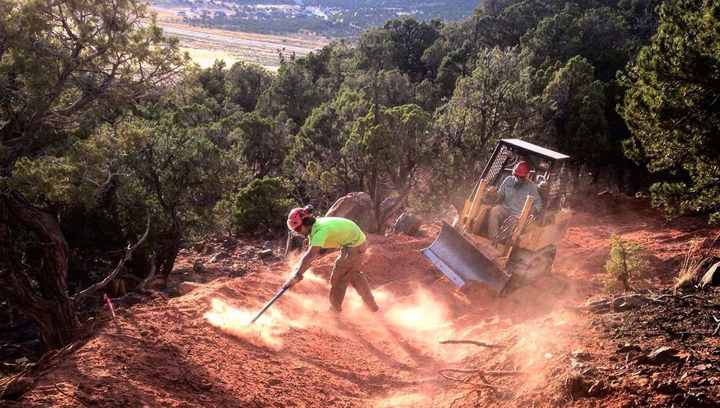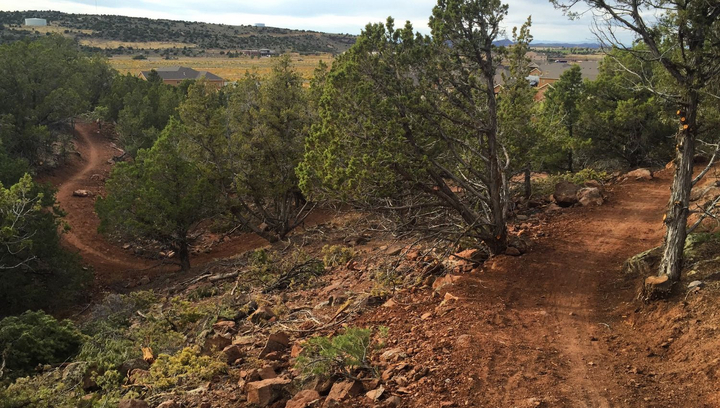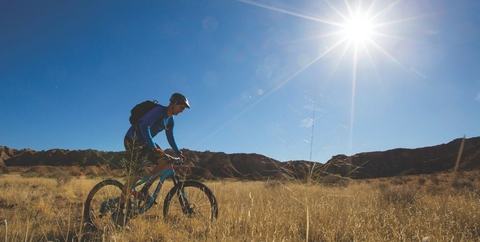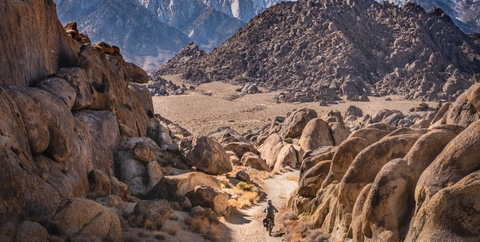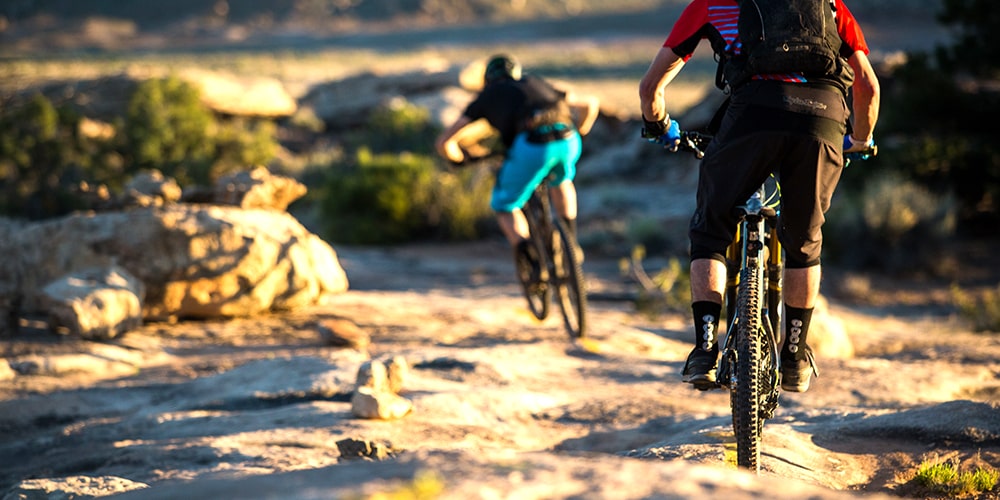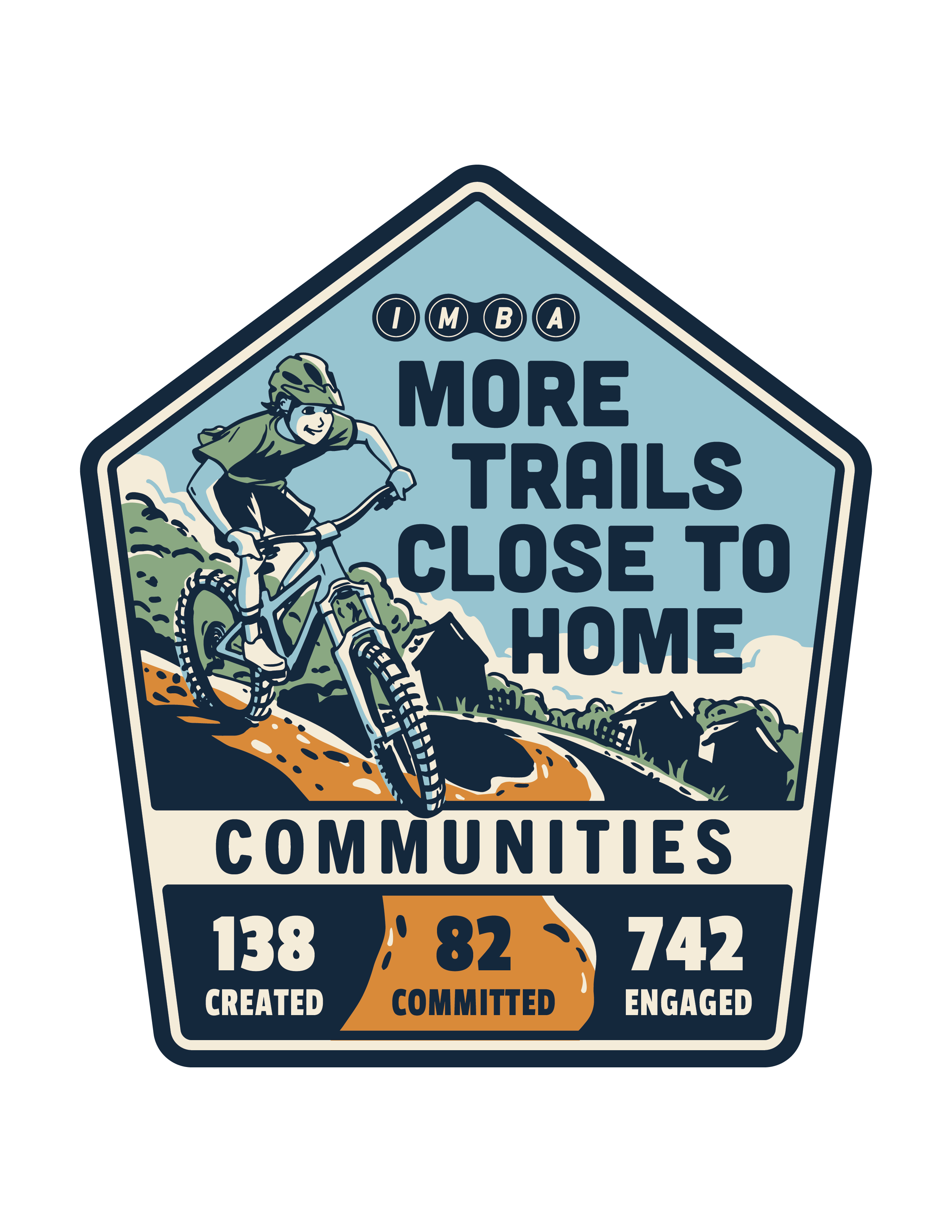Rally Behind the America the Beautiful Act
CEDAR CITY, UTAH August 30, 2024 - Wildfires and fire danger have always played a role in how recreationists experience the great outdoors. Since 2000 in the U.S., the average annual acreage of wildfires have more-than-doubled averages seen during the 1990s. Fire seasons each year are longer, more intense, and cause greater impact on people’s lives and communities, on the environment, and on outdoor recreation.
Fires can have profound impacts on trail systems as well as trail communities, and through positive, proactive relationships with land managers, mountain bikers can contribute to fire mitigation, landscape health, and great trails close to home.
Fires in Utah
This summer brought fires and related impacts close to home for the people of Cedar City, Utah, for the Iron Hills Trail System, and the members of Iron Trailcraft (an IMBA chapter). The proximity and impacts of the fires prioritized efforts to reduce fire-related impacts in the region.
Discovered July 12, 2024 the Graff Point Fire (about five miles south of Cedar City) burned over 550 acres before its containment near the end of the month. It resulted in evacuation orders for homes, cabins and trailers in the Shurtz Canyon area. With the Anderson Fires to the south and Iron Peak fires to the north still burning, timely intervention is needed to protect Utahns, their homes, their landscapes, ecosystems, and wildlife.
The Shurtz Canyon Hazardous Fuels Reduction Project area in Iron County, near Cedar City, Utah was selected for treatment by the Bureau of Land Management also because these communities are amongst the highest wildfire risk areas within the Color Country District. The goal of the project is to reduce fire risk in the Shurtz Canyon corridor. While this work is critical, mitigation plans presented in the project could severely damage Cedar City’s Iron Hills Trail System, a designated National Recreation Trail and one of the country’s best models of trails close to home. Public comment is open on the plan through September 11th. IMBA has put together guidance for comments to inform an approach to fire mitigation tactics that would properly protect an incredible trail system that has transformed the community in Cedar City, Utah.
Public Engagement
During the preparation of the Environmental Assessment , the public was notified of the planning effort for the Shurtz Canyon Hazardous Fuels Reduction Project by an initial posting to the BLM’s ePlanning website on October 12, 2023. The Bureau of Land Management Color Country District, Cedar City Field Office partnered with agencies including the Cedar Livestock Association, Cedar City Fire Department, Utah Forestry Fire and State Lands, Utah Division of Wildlife Resources, and the Cedar Highlands Community Fire Council to conduct internal scoping and to complete the Interdisciplinary Team checklist, NEPA processes related to scoping and analysis for a Hazardous Fuels Reduction Project. Issues identified through this process were incorporated into the Environmental Assessment for consideration.
The second phase of this process is happening now. The BLM is providing a 30-day public review and comment period for the Hazardous Fuels Reduction Project which opened August 12th, 2024 and ends on September 11th, 2024.
Action is needed to uplift the voices of the outdoor recreation community to support the BLM, to employ trail maintenance best practices to protect the $1.5 million dollar trails infrastructure identified in the Shurtz Canyon Hazardous Fuels Reduction Project area, and to leverage maintenance strategies that support fire mitigation and ensure healthy, sustainable landscapes for years to come.
Submit a Comment by September 11, 2024
Balancing Fire Mitigation and Support for Trails in Your Comment
IMBA Trail Solutions have been building and maintaining trails and trail systems across the globe since the early 1990s, alongside our local member organizations like Iron Trailcraft in Cedar City. For more than 30 years, IMBA advocates, trail builders, planners, designers, and local member organizations have collaborated with BLM, National Forest Service, and other land management agencies’ professionals to identify actionable best practices that can help to balance wildfire mitigation, impacts of trail infrastructure in communities, outdoor recreation user experiences, and landscape health. Reducing risk to humans and communities is paramount, and leveraging techniques that will safeguard economic investments in trails can also ensure that trail systems continue to draw new residents and tourists, contribute to local economies, and protect access to outdoor recreational opportunities that improve community and personal health.
Great trails are a community investment that contribute to local, regional, and statewide economies; people’s mental and physical health; long-term landscape health; and community resilience, providing unforgettable outdoor recreational experiences that keep people coming back.
Uplift the Voices of Mountain Bikers: Support Iron County Efforts
As you are crafting your comment, we encourage you to ask for substantive details and clarification about the following:
- Protecting the Asset: An Incredible, $1.5 Million Dollar Trail System
- Best practice trail building and maintenance techniques that leverage landscape conservation can help protect the trails infrastructure while allowing effective hazardous fuels reduction treatment and maintaining viewsheds and user experiences. Please consider in greater detail how existing, fresh, and scheduled-to-be-built trails can be protected from soil erosion and destruction in this plan.
- Uplift the Economic Impact of Outdoor Recreation and Trails
- Outdoor recreation is a $646 Billion dollar industry in the U.S. with over 140 million Americans engaged. The economic impact of outdoor recreation was largely under researched and understated in this Hazardous Fuels Reduction Project. With visitors drawn in greater numbers each year to this area, the contribution to local economies by the outdoor recreation infrastructure should not be stunted just as it begins to expand.
- Trails Contribute to Long-term Landscape Health
- Sustainable trail design, maintenance and stewardship contribute to landscape health by mitigating erosion, uplifting viewsheds, and engaging local communities in stewardship. In no world do outdoor recreationists want trails protected over people, and in this case, it is very possible to improve details of treatments to ensure protection for all of the goals and intended outcomes listed in Section 1.2 on page 2 of the Hazardous Fuels Reduction Project.
- Maps Are Important
- Maps tell the visual tale of projects and impacted areas, and help stakeholders orient themselves and understand the context of any management plan. Please update the maps in this Hazardous Fuels Reduction Project to reflect the recent changes to outdoor recreation infrastructure in the affected areas. IMBA can provide a map that reflects the current state of professionally designed, engineered, and built trails in and around Cedar City as of 9/1/2024.
- Engage With Local Partners in Outdoor Recreation and Stewardship
- The people and volunteers of local trails, outdoor recreation, and volunteer organizations contribute millions of dollars each year to outdoor recreation infrastructure with their wallets and with their time. Local trails organizations are essential partnerships in the protection, preservation, and stewardship of trails infrastructure, and have connections and insights that can provide another layer of evidence to inform decisions. Reach out to your local non-profit and outdoor recreation partner! We are in this with you, and are proud to support the BLM and partner for America’s public lands.
- Protect Places for Kids to Play
- Since 2012, the Utah High School Cycling League (an affiliate league of the National Interscholastic Cycling Association) has been actively engaging increasing numbers of kids in competitive cycling. It was the largest first-year league in NICA history, and just two years later, grew to become the largest league in all of NICA. From hosting 9 races in between two regions in 2016 to expanding to a record 25 races and 6 regions in 2022, the Utah League engages over 5,000 youth and over 2700 registered coaches on Utah’s trails every year. Trail systems like the Iron Hills provide invaluable places for Utah’s Youth to get outside and move their bodies.
- Thank You!
- Thank you for the opportunity to impact this plan, for the ongoing partnership, and for the stewardship you provide to America’s Public Lands. The trails community sees your work, and appreciates all your time, efforts, and interdisciplinary expertise.
If you are interested in including some deeper-dive and additional details in your substantive, public comment on the Shurtz Canyon Hazardous Fuels Reduction Project Environmental Analysis, download this document and use it to craft your personal comment.
Submit a Comment by September 11, 2024
We Can Help
So far this year, Utah has experienced more than 1,000 fires burning across over 53,000 acres in the state. Over 560 of these are known to be human-caused (source). Cedar City has been investing in trails for close to a decade, with plans for the future close to fruition. Coming soon is an expansion to the Iron Hills Trails System. Let's activate the power of the trails community and speak up to support the BLM in the fire mitigation efforts and protect the $1.5 million dollar trail system and all it brings to residents and visitors to Cedar City.
Mountain bikers and trails advocates can support the work of the BLM and other land management and fire agency professionals by participating in public comments like this one. "Efforts to thin and help create a natural mosaic of forest vegetation are necessary for sustainable outdoor recreation, and can be achieved through an approach that is responsible, resilient, and considerate of economic drivers of local communities” said IMBA’s Policy Director, Aaron Clark. Through participation in stewardship of America’s public lands, our contributions to sustainable trail building and maintenance will continue to support resilient and healthy landscapes, and healthy, happy people, on and off the trail.
Learn more from Outdoor Alliance about Wildfire and Recreation in the West.
